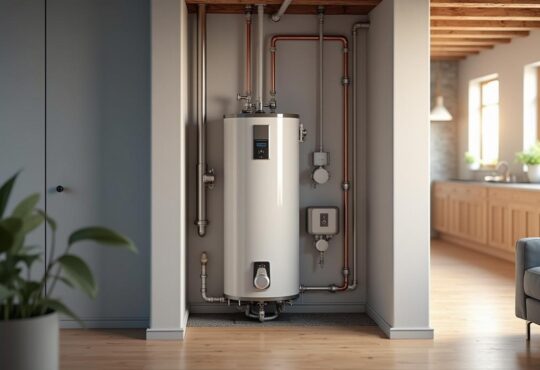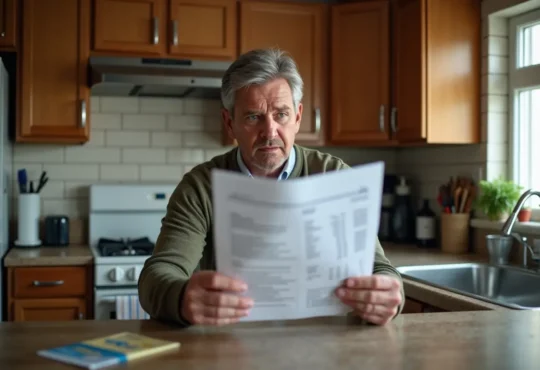
How to Clean a Sink Drain
Imagine walking into your kitchen or bathroom, only to be greeted by an unpleasant odor emanating from the sink drain. It’s an all-too-common scenario that can quickly turn your cozy home into an unpleasant environment. Fortunately, with the right techniques and a little elbow grease, you can clean and restore your sink drain to their pristine condition.
Contents
- 1 Root Causes of Clogged Drains
- 2 Benefits of Regular Drain Maintenance
- 3 DIY Solutions for Unclogging Sink Drains
- 4 Professional Drain Cleaning Services: When DIY Isn’t Enough
- 5 Maintaining Odor-Free Drains
- 6 Preventing Future Clogs and Odors
- 7 Addressing Specific Drain Challenges
- 8 Eco-Friendly and Safe Drain Cleaning Practices
- 9 Plumbing Maintenance and Repair Services
- 10 FAQ
Root Causes of Clogged Drains
Before we look into the solutions, it’s essential to understand the root causes of clogged drains. In the kitchen, the primary culprits are food particles, grease, and oils that accumulate over time, creating a sticky mess that clogs the pipes. In the bathroom, hair, soap scum, and mineral buildup are the usual suspects.
As these substances accumulate, they form a barrier that restricts water flow, leading to slow draining or complete blockages. If left unchecked, these clogs can escalate into more severe plumbing issues, necessitating costly repairs or replacements.
Benefits of Regular Drain Maintenance
Maintaining clean and clear drains is not just about aesthetics; it’s also a matter of hygiene and efficiency. By keeping your drains free of clogs and odors, you can:
- Prevent the growth of harmful bacteria and mold, which can pose health risks.
- Avoid water damage caused by overflowing sinks or backed-up drains.
- Extend the lifespan of your plumbing system, saving you money in the long run.
- Maintain a fresh and inviting atmosphere in your home.
Regular drain maintenance is a proactive approach that can save you from the hassle and expense of dealing with major plumbing issues down the line.
DIY Solutions for Unclogging Sink Drains
When it comes to unclogging sink drains, several DIY solutions can be effective, cost-efficient, and environmentally friendly. Here are some tried-and-true methods to consider:
Dynamic Duo: Baking Soda and Vinegar
This classic combination is a powerhouse when it comes to unclogging drains. Baking soda is a gentle abrasive that helps break down gunk and grime, while vinegar’s acidic nature dissolves organic matter and neutralizes odors.
To use this method, follow these simple steps:
- Pour 1/2 cup of baking soda down the drain.
- Follow it up with 1 cup of white vinegar.
- Let the mixture fizz and work its magic for 15-20 minutes.
- Flush the drain with hot water to rinse away the loosened debris.
Salty Solution
If your drain is clogged with grease or soap scum, salt can be an effective remedy. The abrasive nature of salt helps scrub away the buildup, while hot water melts and flushes it away.
Here’s how to use this method:
- Pour 1/2 cup of salt down the drain.
- Follow it up with a kettle of boiling water.
- Let the mixture sit for a few minutes before flushing with more hot water.
Plunger Technique
Sometimes, a good old-fashioned plunger is all you need to dislodge a stubborn clog. This method works by creating a vacuum that dislodges the blockage and allows water to flow freely.
To use a plunger effectively, follow these steps:
- Fill the sink with enough water to cover the plunger’s cup.
- Place the plunger firmly over the drain opening.
- Plunge vigorously, creating a suction that dislodges the clog.
- Repeat the process until the water starts draining smoothly.
Drain Snake (or Auger)
For more stubborn clogs that resist other DIY methods, a drain snake (also known as an auger) can be a game-changer. This flexible tool is designed to navigate through pipes and break up blockages, allowing water to flow freely once again.
While using a drain snake requires some patience and technique, it’s a valuable tool to have in your arsenal for tackling persistent clogs.
Enzymatic Drain Cleaners
If you prefer a more natural approach, enzymatic drain cleaners can be an effective alternative to harsh chemical cleaners. These products contain enzymes that break down organic matter, effectively dissolving clogs and eliminating odors.
Always follow the manufacturer’s instructions when using these products, and be sure to choose eco-friendly options to minimize your environmental impact.
Professional Drain Cleaning Services: When DIY Isn’t Enough
While DIY solutions can be effective for minor clogs and routine maintenance, there are times when professional assistance is necessary. If you’ve tried multiple methods without success, or if you suspect a more serious issue, it’s time to call in the experts.
Professional drain cleaning services offer a range of advanced techniques and specialized equipment to tackle even the most stubborn clogs. Here are some of the methods they may employ:
Hydro Jetting
Hydro jetting is a powerful technique that uses high-pressure water jets to blast through clogs and clear debris from your pipes. This method is particularly effective for removing stubborn buildup and tree roots that have infiltrated your plumbing system.
Camera Inspection
Before attempting any major repair or replacement, professional plumbers may use specialized cameras to inspect the inside of your pipes. This allows them to identify the exact location and nature of the clog, ensuring a targeted and effective solution.
Drain Snaking
While you can use a basic drain snake at home, professional plumbers have access to more advanced snaking equipment that can navigate deeper into your plumbing system and tackle more severe blockages.
Chemical Treatments
In some cases, professional-grade chemical treatments may be necessary to dissolve particularly stubborn clogs or remove buildup that has accumulated over time. These treatments are handled with care and expertise to ensure safety and effectiveness.
By enlisting the help of professional drain cleaning services, you can rest assured that your plumbing issues will be addressed thoroughly and efficiently, minimizing the risk of future problems.
Maintaining Odor-Free Drains
While unclogging your drains is essential, preventing odors from recurring is equally important. Here are some tips to keep your drains smelling fresh and inviting:
Routine Flushing
Make it a habit to flush your drains regularly with hot water. This simple practice can help dislodge any debris or buildup that may be accumulating, preventing odors from developing in the first place.
Baking Soda and Vinegar Deodorizer
In addition to its unclogging prowess, the baking soda and vinegar combination can also be used as a natural deodorizer. Simply pour the mixture down your drains once a week to neutralize any lingering odors.
Lemon and Salt Scrub
The citric acid in lemon and the abrasive nature of salt make for an effective natural scrub that can help remove gunk and deodorize your drains. Simply cut a lemon in half, sprinkle salt on the cut side, and use it to scrub the inside of your drain.
Enzyme Cleaners
As mentioned earlier, enzyme-based cleaners can be a great option for breaking down organic matter and eliminating odors. Look for eco-friendly options that are safe for your plumbing system.
Garbage Disposal Maintenance
If your kitchen sink is equipped with a garbage disposal, regular maintenance is crucial to prevent odors from developing. Make sure to run the disposal frequently, and consider using a disposal cleaner or deodorizer to keep it fresh.
By incorporating these simple practices into your routine, you can enjoy fresh, odor-free drains and a more pleasant home environment.
Preventing Future Clogs and Odors
While unclogging and deodorizing your drains is essential, prevention is the best cure. Here are some tips to help you avoid future clogs and odors:
Be Mindful of What Goes Down the Drain
One of the most effective ways to prevent clogs is to be mindful of what you allow to go down the drain. Avoid pouring grease, oils, or fat down your kitchen sink, as these substances can solidify and create blockages. Similarly, be cautious about flushing hair, soap scum, or other debris down your bathroom drains.
Use Drain Strainers and Catchers
Installing drain strainers or catchers can help catch larger debris before it has a chance to enter your pipes and cause a clog. Be sure to clean these strainers regularly to prevent buildup.
Scrape Plates Before Washing
Before rinsing dishes in the kitchen sink, be sure to scrape off any larger food particles into the trash or compost bin. This simple step can go a long way in preventing clogs and odors from developing.
Schedule Regular Professional Maintenance
Even with diligent DIY maintenance, it’s a good idea to schedule regular professional drain cleaning services. A trained plumber can thoroughly inspect and clean your pipes, ensuring that any potential issues are addressed before they escalate into major problems.
By following these preventive measures, you can significantly reduce the likelihood of future clogs and odors, saving yourself time, money, and frustration in the long run.
Addressing Specific Drain Challenges
While the methods discussed above are effective for most common drain issues, some situations may require more specialized approaches. Here are a few specific challenges and how to address them:
Grease Clogs in Kitchen Sinks
Grease clogs can be particularly stubborn and difficult to remove. In addition to the baking soda and vinegar method, you can try pouring a pot of boiling water down the drain to help melt and dislodge the grease. If the clog persists, consider using a drain snake or calling a professional for hydro-jetting services.
Hair Clogs in Bathroom Sinks and Showers
Hair can quickly accumulate and create clogs in bathroom drains. In addition to using a drain snake or plunger, you can try pouring a mixture of baking soda and salt down the drain, followed by hot water. The abrasive nature of the salt can help break down the hair clog.
Mold and Mildew in Drains
If you notice mold or mildew growth in your drains, it’s important to address the issue promptly. A solution of bleach and water can help kill the mold and mildew, but be sure to follow safety precautions and ventilate the area properly. For stubborn cases, you may need to enlist the help of a professional.
Slow-Draining Sinks
If your sink is draining slowly but not completely clogged, you may have a partial blockage or buildup in your pipes. Try using a drain snake or plunger to dislodge the obstruction. If the issue persists, consider having a professional inspect and clean your pipes using hydro-jetting or other advanced techniques.
By understanding these specific challenges and employing the appropriate solutions, you can ensure that your drains remain clear and odor-free, no matter what obstacles they may face.
Eco-Friendly and Safe Drain Cleaning Practices
While keeping your drains clean and clear is essential, it’s also important to consider the environmental impact of the products and methods you use. Harsh chemical drain cleaners can be harmful to both your plumbing system and the environment, potentially causing damage and contributing to pollution.
Fortunately, there are many eco-friendly and safe alternatives available. Here are some practices to consider:
Use Natural and Biodegradable Products
When possible, opt for natural and biodegradable drain cleaning products. Look for options that contain enzymes, baking soda, vinegar, or other plant-based ingredients. These products are often just as effective as chemical cleaners but are gentler on the environment and your plumbing system.
Avoid Chemical Drain Cleaners
Chemical drain cleaners can be harsh and corrosive, potentially damaging your pipes and releasing toxic fumes. If you must use a chemical cleaner, exercise caution and follow all safety instructions carefully.
Utilize Professional Hydro Jetting Services
Professional hydro jetting services use high-pressure water to clear clogs and buildup without the need for harsh chemicals. This eco-friendly method is effective and safe for your plumbing system and the environment.
Dispose of Waste Properly
When unclogging your drains, be sure to dispose of any debris or waste properly. Avoid flushing it down the drain, as this can contribute to further clogs and environmental pollution.
By adopting eco-friendly and safe drain cleaning practices, you can maintain a clean and functional plumbing system while minimizing your environmental impact and protecting your health and safety.
Plumbing Maintenance and Repair Services
While DIY solutions and preventive measures can go a long way in keeping your drains clean and clear, there may be times when professional assistance is necessary. Enlisting the help of a reputable plumbing service can ensure that your drain issues are addressed efficiently and effectively, preventing further damage and costly repairs down the line.
Choose a plumbing service with a proven track record and commitment to customer satisfaction. Professionals should expertly diagnose and resolve complex drain issues using the latest tools and techniques.
In addition to drain cleaning and unclogging services, a reputable plumbing company should also offer a range of other services, such as:
- Pipe repair and replacement
- Water heater installation and maintenance
- Sewer line inspection and repair
- Bathroom and kitchen plumbing upgrades
- Emergency plumbing services
By partnering with a reliable plumbing service, you can enjoy peace of mind knowing that your home’s plumbing system is in capable hands, ensuring a safe, efficient, and hassle-free experience.
FAQ
What is the best thing to clean sink drains with?
Besides commercial drain cleaners, some of the most effective and eco-friendly options for cleaning sink drains include baking soda and vinegar, salt and hot water, and enzymatic cleaners. These natural solutions are gentle on pipes while effectively breaking down clogs and eliminating odors.
How do you clean gunk out of a sink drain?
To remove gunk and buildup from a sink drain, start by pouring a mixture of baking soda and vinegar down the drain. Let it sit for 15-20 minutes, then flush with hot water. You can also try using a drain snake or plunger to dislodge stubborn clogs. For tougher cases, consider using a professional hydro jetting service.
How do you get rid of buildup in a sink drain?
Try pouring a pot of boiling water down the drain, followed by a mixture of baking soda and vinegar. The heat and chemical reaction can help dissolve and dislodge buildup. You can also use a drain snake or plunger to physically remove the buildup.
How to get rid of black mold in sink drain?
Pouring a solution of bleach and water down the drain can be very effective. Let it sit for several hours, then flush with hot water. You can also try using a mixture of baking soda and vinegar, followed by hot water. For persistent mold issues, it’s best to consult a professional plumber for more advanced treatment options.
What is the best homemade drain cleaner?
One of the most effective and eco-friendly homemade drain cleaners is a combination of baking soda and vinegar. Simply pour 1/2 cup of baking soda down the drain, followed by 1 cup of vinegar. Let the mixture fizz and work for 15-20 minutes, then flush with hot water. Alternatively, use a mixture of salt and hot water or a lemon and salt scrub.
Should I pour boiling water down the drain?
Pouring boiling water down the drain can dislodge clogs and buildup. However, Avoid pouring it directly onto ceramic surfaces to prevent cracking. Instead, let the water cool slightly before pouring it down the drain.





 Hi I'm Joe.
Hi I'm Joe. 